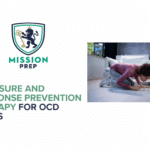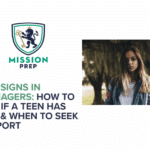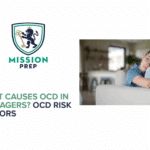Coping With OCD as a Teenager: Daily Coping Strategies and Support for Teen OCD

Coping with OCD as a teenager can be challenging – for both your teen and your whole family. It may feel like a never-ending loop of intrusive thoughts, compulsions, and high anxiety.
As a parent, you may not know how to help your child, and may even worry that you’re unintentionally reinforcing their symptoms. But there is hope. With the right tools and support for teen OCD, your child can learn to manage their symptoms and lead a happier life.
If OCD is impacting your teenager’s mental health, seeking professional support is recommended. This page can also help by sharing practical strategies to support your teen in managing their symptoms. It covers:
- What OCD looks like in teens
- Why early intervention matters
- Daily strategies for adolescents coping with OCD
- Ways for parents to support their teen
- How to find professional suppor

OCD in Teenagers
Obsessive-compulsive disorder (OCD) is a condition in which people experience repetitive, intense obsessions and compulsions that typically cause distress and problems with daily functioning.1 It’s also not an uncommon disorder, as it’s estimated to affect roughly one in every hundred children and teens.2
OCD obsessions can cover several themes, from a fear of germs to safety concerns and identity. Compulsions can also take many forms, from the more visible (such as handwashing) to hidden rituals (for example, counting or excessive praying). These rituals are used to ease the distress caused by obsessions, so are usually related to the same theme.
While obsessions and compulsions may vary over time, one thing remains constant: compulsions only ever bring a temporary sense of relief. Yet, this short-term feeling is enough to keep someone repeating their rituals because they don’t know what else to do.
Impact of OCD in Adolescence
Coping with OCD as a teenager can feel complex, as the condition tends to affect many aspects of life. This is because the distress and time taken up by obsessions and rituals can interfere with family dynamics, friendships, and relationships.
For example, due to the mental disruption caused by obsessions, a teen’s focus may be interrupted, potentially resulting in a decline in academic performance. Attempting to manage compulsions may also create difficulties concentrating.
Additionally, adolescents with OCD may feel more emotionally vulnerable due to the distress or anxiety caused by OCD, or potential embarrassment or shame over the theme of their obsessions.3 Conflict in relationship dynamics may also arise due to frustrations or a lack of understanding over strict routines or the need to perform rituals.
Due to misconceptions around OCD, as well as how ‘typical’ teenage habits can sometimes be confused for obsessions, there may be a need to define OCD vs. typical teen behavior. The next section addresses this distinction.
OCD vs. Typical Teen Behavior
If you’re wondering whether your teen has OCD or is just displaying “normal” teenage behavior, it might help to check out our page OCD Signs and Symptoms. However, as an overview, OCD differs from typical teen behaviors in several key ways, including:
- Typical teen “obsessions” often involve favorite celebrities, sports teams, or trends, but if these obsessions are enjoyable or neutral, they are not signs of OCD. In contrast, OCD obsessions are unwanted and intrusive thoughts that cause anxiety or distress.
- Teenagers often have certain routines, such as waking up in the morning and going to bed at a set time. They may also have a preferred schedule for getting ready or preparing for things like a study session. If these routines are interrupted, it’s unlikely to cause them extreme upset. However, OCD rituals are driven by anxiety, and interruptions to these often cause intense distress.
- Typical adolescent routines or thoughts don’t often negatively impact their academic work, relationships, or activities day-to-day. Yet OCD can significantly affect these areas of functioning.
As may be clear, OCD can be a debilitating condition for teens to live with. However, with professional support, they can go on to live more balanced lives free from the shackles of OCD.
Why Early Support Matters for OCD
Unfortunately, OCD isn’t usually a phase teens will “grow out of”. It’s a mental health condition that can seriously affect everyday life. So far, we’ve covered some of the impacts OCD can have on a teen, but what happens when OCD goes untreated into adulthood? Let’s take a look at the potential lifelong impact of OCD.
Lifelong Impact of OCD:
OCD has the potential to affect mental health throughout life. In fact, research shows that teens with OCD are at an increased risk of developing anxiety disorders in adulthood.4 Additionally, 90% of people with OCD also experience at least one other mental health condition, and aside from anxiety, this most frequently involves mood disorders like depression.5
Therefore, as an adult, untreated OCD may continue to interfere with many areas of life. It might cause problems at work, home, and with social life, as it can impact how someone feels and behaves around their partner, family, and friends. Plus, as mood disorders like anxiety can negatively impact physical health, there may also be a risk of somatic issues like high blood pressure and heart rate.
It’s worth noting that symptoms of OCD can vary in severity and intensity, as well as in the theme of obsessions and compulsions. So there may be periods where symptoms are less intrusive, and others when they feel unbearable. This is why receiving timely help is often so important – so that OCD symptoms can be treated before they escalate and become detrimental to daily life.
Furthermore, practical strategies help those coping with OCD as a teenager. We explore some strategies that teens can implement in their day-to-day lives in the following sections.
Daily Strategies OCD Teens Can Use
For teens living with OCD, having a daily structure may assist in reducing extra stress and anxiety that can exacerbate OCD. It can also help adolescents incorporate healthy routines and self-care into their daily lives.
If you’re unsure how to begin, the following are some suggestions of beneficial strategies for teens tackling OCD.
Learn About OCD
OCD self help for young adults begins with education. Understanding how OCD affects them specifically can be an empowering process. It can increase their self-awareness and may enable them to feel compassionate toward themselves on tough days. This can be particularly useful when conducting exposure and response prevention (ERP) – the most effective treatment for OCD.6
Label Thoughts
One of the coping skills OCD adolescents often find useful is thought labeling. This is the process of recognizing thoughts for what they are: thoughts, not facts. Therefore, being able to more accurately label thoughts related to OCD can be a powerful way to reduce the fear they often cause.
For example, an intrusive thought such as, Did I check I locked the door when I left for school this morning? could be relabeled as, I’m having a thought that I didn’t check the door when I left for school today, or This thought isn’t a fact; it’s OCD.
By reframing an obsession in this way, a teen has the opportunity to step back and see that thoughts don’t guarantee something bad will happen.
Practice Mindfulness
Mindfulness is a practice that allows you to be present in the moment and let thoughts come and go without becoming attached to them. Being able to focus on what is happening in the here and now can be a great asset to the toolkit for coping with OCD as a teenager.
For example, learning how to let your thoughts drift by, such as by using a visualization – without prompting a reaction – is a part of mindfulness OCD teens may find valuable. It may also help them to sit with uncomfortable beliefs and realize that thoughts themselves cannot harm them.7,8 Plus, combining the skills of mindfulness and thought labeling can be instrumental to recovery from OCD.
Some examples of mindfulness activities include breathing exercises, visualizations, and grounding practices. Check out our guide, Mindfulness & Meditation for Teens for more exercises.
Journal
Keeping a journal is a handy way to track triggers and symptoms of OCD. It allows teens to notice patterns over time, empowering them to make changes. It can also be an invaluable tool when carrying out ERP exercises, as it’s convenient for keeping a record of their OCD recovery progress. An additional benefit of journaling is that it may enable them to reflect on how far they have come on their healing journey, motivating them to continue.
Try CBT Techniques for OCD
If your teen is attending cognitive behavioral therapy (CBT) for OCD treatment, they may have set homework for between sessions. Completing this homework is essential for OCD recovery and often involves exposure exercises or practices for managing anxiety.
Yet, even if your teen doesn’t currently see a therapist, there are CBT techniques that can be practiced at home to help improve their OCD symptoms. For instance, thought challenges and relaxation exercises to help improve symptoms of anxiety, or exposure exercises to allow a teen to face their fears in a slow, gradual way. You can find out more on our CBT Techniques for Teens page.
Engage in Self-Care
One of the healthiest routines OCD teens can adopt involves self-care. Practicing self-care means doing things that are good for your overall well-being and health. Some of the most effective suggestions for self-care activities include:
- Getting good quality sleep
- Exercising or regularly moving
- Eating a healthy, balanced diet
- Learning stress management
- Practicing Mindfulness
- Writing in a journal
- Engaging in fun hobbies
Find Support Groups for OCD Teenagers
Joining an OCD support group can be a positive experience for many teens. Knowing they’re in a space with people who really understand what it’s like to have OCD can bring a sense of community. This is because, in support groups, teens may find others with similar experiences who can offer guidance, support, and a feeling of belonging in a safe environment. These groups exist both online and in the community, so it’s worth finding one that fits in with your teen’s schedule and availability. Coping with OCD as a teenager can be difficult, but establishing daily strategies can be beneficial for mental well-being. Yet it’s also vital for parents to understand how they can best support their teen. The next section provides some suggestions on how to help your teen manage their OCD.Parents: How to Help Manage Teen OCD
It may be confusing to know how to support your child with OCD without doing anything that might set their recovery back. With this in mind, the following are suggestions for ways to help your teen during their OCD recovery journey:
- Create a supportive environment: Make your home a safe space for your teen to talk about their concerns without criticism. Listen to them, validate their feelings, and let them know that OCD is a condition that can be treated.
- Offer encouragement: If your teen is in therapy and being given homework, gently encourage them to carry it out. This may look like asking what they need to do this week, giving them space to complete their exercises, or agreeing on a particular reward once they’ve finished.
- Avoid accommodations: As a parent, it can be upsetting to see your child struggle with OCD. Sometimes, you may want to help them carry out their compulsions so that they can feel better for a while. However, participating in their rituals, known as “accommodation,” can actually reinforce OCD. Instead, find ways to say a firm yet compassionate “no” if they ask you to help them with their compulsions.
- Seek professional help: If OCD is impacting your teen’s life and coping strategies aren’t providing enough of a buffer, encourage them to reach out to a mental health professional for support. OCD is a condition that often requires treatment, such as therapy or medication, and a professional will be able to give your teen the support and guidance they need. You could also help them in their search.
It can be heartbreaking to see your teen battle with OCD, but please feel reassured that OCD can be very effectively treated. With the right support and help, your teen can look forward to a brighter future.

Managing OCD With Mission Prep
Coping with OCD as a teenager – and witnessing struggles as a parent – can feel overwhelming, but with the right strategies, support, and understanding, it’s possible for your child to regain control. If you’re unsure where to start or are looking for extra support for your teen, we’re here to help.
At Mission Prep, we specialize in providing compassionate and personalized care for teens living with OCD. With treatment options ranging from evidence-based therapies such as ERP to medication management, our experienced experts are ready to help you with tailor-made treatment plans, coping strategies, and family support.
Reach out to us today for a free consultation to discover how we can help your teen and family progress toward a healthier future.
References
- AACAP. (n.d.). Obsessive Compulsive Disorder Resource Center. Retrieved September 8, 2025. https://www.aacap.org/aacap/Families_and_Youth/Resource_Centers/Obsessive_Compulsive_Disorder_Resource_Center/Home.aspx
- Geller, D. A., Homayoun, S., & Johnson, G. (2021). Developmental Considerations in Obsessive Compulsive Disorder: Comparing Pediatric and Adult-Onset Cases. Frontiers in psychiatry, 12, 678538. https://doi.org/10.3389/fpsyt.2021.678538
- Anxiety and Depression Association of America, ADAA. (n.d.). OCD at school. Retrieved September 8, 2025. https://adaa.org/understanding-anxiety/obsessive-compulsive-disorder/ocd-at-school
- Lewin, A. B., Chang, S., McCracken, J., McQueen, M., & Piacentini, J. (2010). Comparison of clinical features among youth with tic disorders, obsessive–compulsive disorder (OCD), and both conditions. Psychiatry Research, 178(2), 317–322. https://doi.org/10.1016/j.psychres.2009.11.013
- Stein, D. J., Costa, D. L. C., Lochner, C., Miguel, E. C., Reddy, Y. C. J., Shavitt, R. G., Van Den Heuvel, O. A., & Simpson, H. B. (2019). Obsessive–compulsive disorder. Nature Reviews Disease Primers, 5(1). https://doi.org/10.1038/s41572-019-0102-3
- IOCDF. (2024, May 20). OCD in Kids. https://kids.iocdf.org/professionals/mh/about-erp-for-pediatric-ocd/
- International OCD Foundation. (2020, August 5). Mindfulness and Cognitive Behavioral Therapy for OCD. https://iocdf.org/expert-opinions/mindfulness-and-cognitive-behavioral-therapy-for-ocd/
- Bürkle, J. J., Schmidt, S., & Fendel, J. C. (2025). Mindfulness- and acceptance-based programmes for obsessive-compulsive disorder: A systematic review and meta-analysis. Journal of Anxiety Disorders, 110, 102977. https://doi.org/10.1016/j.janxdis.2025.102977
- Brierley, M. E., Albertella, L., Christensen, E., Rotaru, K., Jacka, F. N., Segrave, R. A., Richardson, K. E., Lee, R. S., Kayayan, E., Hughes, S., Yücel, M., & Fontenelle, L. F. (2022). Lifestyle risk factors for obsessive-compulsive symptoms and related phenomena: What should lifestyle interventions target? Australian & New Zealand Journal of Psychiatry, 57(3), 379–390. https://doi.org/10.1177/00048674221085923
- Brierley, M. E., Thompson, E. M., Albertella, L., & Fontenelle, L. F. (2021). Lifestyle Interventions in the Treatment of Obsessive-Compulsive and Related Disorders: A Systematic review. Psychosomatic Medicine, 83(8), 817–833.


















